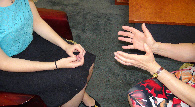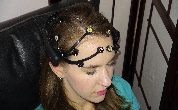
The future in tinnitus treatment
Home

Call us on +61 8 8333 1010



Ten Important Management Strategies
________________________________
Apply these simple techniques to manage your tinnitus and reduce your level of tinnitus perception.

Call us on +61 8 8333 1010
1. Maintain a rich sound environment. This helps to stimulate the auditory pathways and retrain your brain to defocus away from the tinnitus. \if you have significant hearing loss, consider the fitment of hearing aid(as) as appropriate.
2. Use ear protection when sound exposure is likely to cause hearing damage (e.g. loud concerts, occupational noise, movie theatre, prolonged dental work, etc). Ear protection should be selected depending on the situation (e.g. Musician’s ear plugs for concerts and movie theatre; ear muffs for industrial situations; noise cancelling headphones for long haul flights\0.
3. Avoid very quiet environments or blocking your ears or using ear plugs in normal sound level situations. This is particularly relevant in the early stages of tinnitus. Once you have habituated to your tinnitus and hardly ever notice it and are no longer distressed by your tinnitus, you will be able to enjoy very quiet situations again.
4. Do not be overly concerned about temporary spikes in your tinnitus which can occur
from time-
5. Discuss your medications with your GP and/or treating specialist. Some medications
or combinations of medications have been reported to trigger or exacerbate tinnitus
or can cause damage to your hearing -
6. Remember that tinnitus perception is strongly correlated to your degree of stress and anxiety about tinnitus. Fear of tinnitus will enhance your attention to the tinnitus and contribute to distress and anxiety and this will increase your perception of tinnitus. As a consequence, what is a small tinnitus signal can be perceived as overwhelmingly loud as your auditory neural pathways amplify the internal sound.
7. Utilise any technique that reduces your anxiety levels such as relaxation, meditation, mindfulness, hypnosis, neurofeedback, yoga, tai chi, etc. It is important that you receive reassurance, understanding and support from a suitably qualified tinnitus counsellor.
8. The use of appropriately prescribed medication in the early stages of tinnitus
is understandable and acceptable. If medication is of the benzodiazapine family,
then possible addition and withdrawal is a consideration. Short-
9. Remember that invariably tinnitus improves over time and in many people they become
completely unaware of their tinnitus for most of the time. For some people, being
aware of head or ear-
10. Tinnitus perception and intensity invariably eases over time. However, if you become extremely distressed or affected by your tinnitus it is important to talk to someone about it. If you are in an emergency, or at immediate risk of harm to yourself or others, please contact emergency services or 000 and talk to someone now:
Lifeline 13 11 14
Suicide Call back Service 1300 359 467





